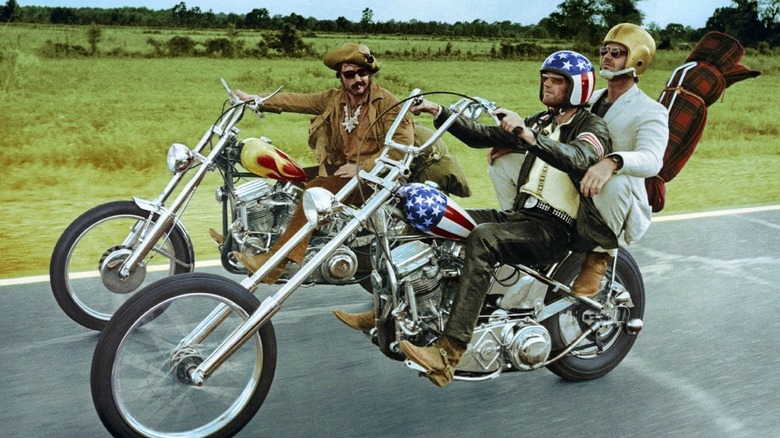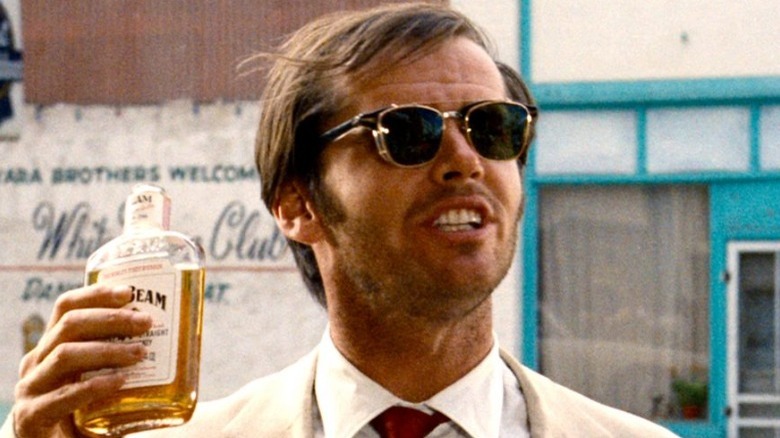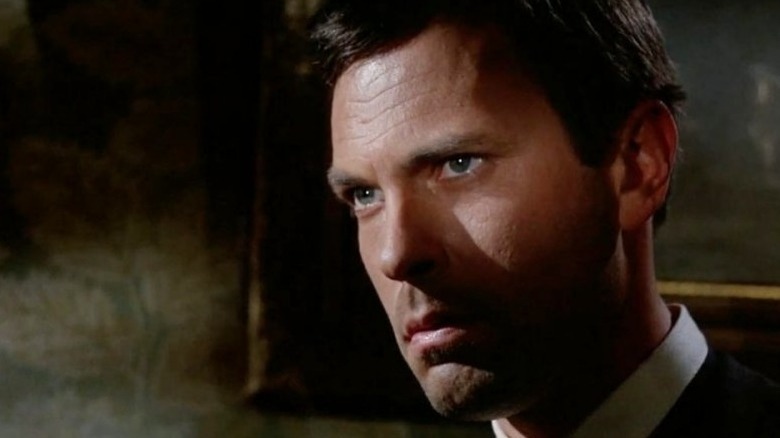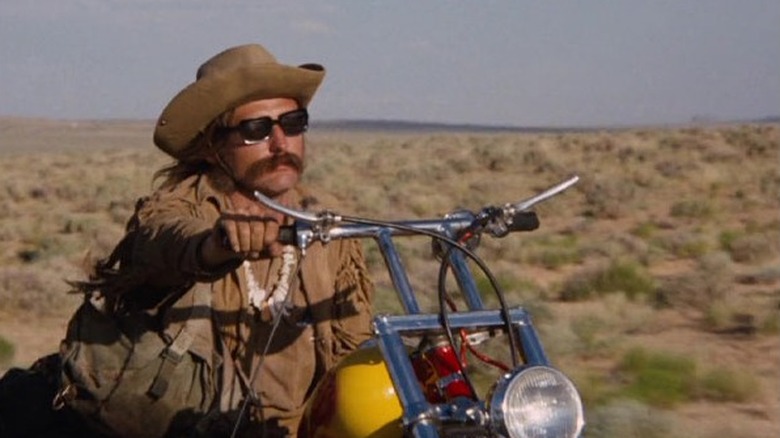Why Rip Torn Sued Dennis Hopper Over Easy Rider
"Easy Rider" changed everything. The 1969 classic — filmed on a $360,000 budget – tore up the box office and made movie stars of its lead actors and co-writers, Peter Fonda (who also produced) and Dennis Hopper (who also directed). It also gave Jack Nicholson his breakout role: George Hanson, a southern lawyer with a drinking problem who finds his mind blown by the drugs and freewheeling lifestyle of his biker buddies. Nicholson wasn't the original choice.
George was meant for the tough, volatile character actor Rip Torn, whose career would explode in the '90s in "The Larry Sanders Show" and "Men in Black." According to Lee Hill's "A Grand Guy," the role was written for Torn by Terry Southern, the novelist and screenwriter who'd befriended the actor on the set of 1965's "The Cincinnati Kid." Torn had yet to reach stardom, but he had created a varied and strong body of work in theater and film. Much like Nicholson, he was on the cusp of an incredible breakthrough, and the right role could have made it happen. He probably could have crafted a more convincing southern accent too.
One emotionally charged night kept Torn from getting the role, however, and the incident went on to become an infamous Hollywood story. In a New York restaurant at the height of "Easy Rider's" pre-production, Torn and Hopper (and Fonda) were having dinner when an argument broke out, a knife was pulled, and Torn was no longer in the movie. Exactly who pulled the knife, and what the fight was about, would be debated for years — but one thing was for certain: damage was done.
Recasting George
In the wake of a fight like that, it made sense for Dennis Hopper to recast the role. He and Peter Fonda chose Jack Nicholson, a great and then-underrated actor who'd also written the screenplay for Roger Corman's 1967 LSD flick "The Trip," in which the two had starred. Hopper's first taste of directing had come from doing second-unit work on that film. Nicholson's performance as George in "Easy Rider" effectively gave the mainstream audience a surrogate to understanding bikers' culture, and it's difficult to imagine the movie without him in it — or his career without the movie.
Rip Torn, meanwhile, saw his reputation bruised by the incident. No matter who pulled the knife at the dinner, it's a serious accusation to level. When Hopper claimed in a 1994 appearance on "The Tonight Show with Jay Leno" that Torn had pulled the knife as retaliation for cutting him out of the picture, Torn sued him for defamation of character. Not only that, he claimed that Hopper was the one who pulled the knife, after the two had an argument about "rednecks."
According to a 2006 profile on Torn, "Hopper's version of the tale hurt his career, spreading an unjustified image of him as unstable and violent."
Volatility
In Studs Terkel's 1974 oral history of various professions, "Working," Rip Torn shows up briefly to discuss the nature of professional acting, and the degree to which it makes shills out of artists. As he says in the book, "they want you to be their silly putty," an attitude that speaks to the anger, independence, and lack of kiss-ass he gave to big Hollywood types. Not that Dennis Hopper was, or really ever would be, a big Hollywood type.
One thing that might have led to their tension was their similarities. They were complex men. Both had tempers and various addictions (as evinced by the 1971 Hopper-focused documentary "The American Dreamer" and Rip Torn's late-in-life drunken bank robbery) and both were capable of sabotaging their own careers. After Hopper found massive success directing and starring in "Easy Rider," he was given carte blanche to make whatever movie he wanted. Studios knew only that he had an innate understanding of youth culture, and Universal Pictures couldn't have known that its decision would lead to Hopper making a critically maligned, bizarre, existential film called "The Last Movie" about a stuntman in Peru.
That movie's failure to connect with audiences and critics who'd adored "Easy Rider" led to Hopper's effective ousting from the Hollywood mainstream. Not too different from Torn.
Old stories
By the 1990s, both Dennis Hopper and Rip Torn were able to settle into a degree of Hollywood respectability, the time since "Easy Rider's" release having been hard on both of them. Torn continued to work steadily, fighting writer-director Norman Mailer on camera and getting acclaim for his roles in 1972's "Payday" and 1983's "Cross Creek" (for which he was nominated for an Oscar). Hopper took work where he could get it, directing 1980's harrowing punk drama "Out of the Blue," and his addictions continued to grow, swallowing him wholesale when he surrounded himself with lit dynamite at a screening of the movie in Houston.
When Torn found major name recognition in 1992 by starring in legendary HBO sitcom "The Larry Sanders Show," Hopper was getting major motion picture roles in movies like "Speed" and "True Romance." Hopper maintained his story of Torn pulling the knife on him during pre-production of "Easy Rider."
Knowing the demons faced by both men, it's possible to imagine either having been responsible. In this case, however, the truth of the matter was backed up by writer Terry Southern, who suffered his own difficulties with Hopper (and Peter Fonda) over credit for "Easy Rider." Hopper's claims only stopped when Torn sued him for defamation, and the courts ruled in Torn's favor. In the end, Hopper was made to pay the man who was going to star in "Easy Rider" so long ago nearly $1 million.



